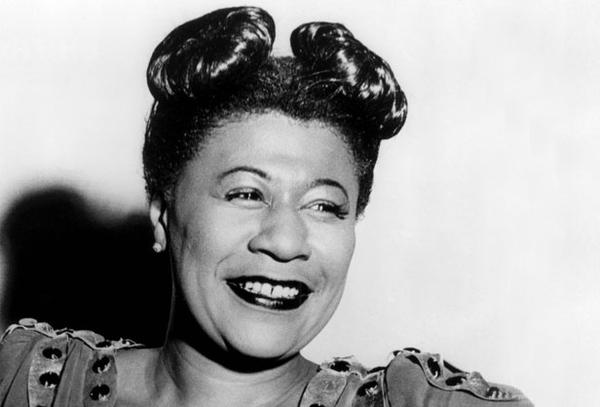Never Far From the Blues
March is National Women’s History Month! We’ll be sharing stories about some of the most accomplished women in jazz, both nationally and locally. We hope you enjoy this tribute to the women of jazz.
***
The Queen of Jazz. The First Lady of Song. Lady Ella. These monikers describe one of America’s most beloved jazz singers. But they were earned through hard work. There was nothing royal about the early life of Ella Fitzgerald. Perhaps she sang the blues so effortlessly because she knew the blues so well.
Born in Virginia in 1917 to an unwed mother, Ella Jane moved around a lot during her childhood, eventually landing in a one-room New York apartment. Her world fell apart when her mother died of a heart attack when Ella was only 15. She dropped out of school and reportedly supported herself as a lookout at a brothel. Some say she was involved with the Mafia. She escaped from reform school and, homeless, began singing for money on the streets of Harlem. She entered a talent contest at the famed Apollo Theatre and won $25, but she was unable to take advantage of the opportunity to perform there for a week because she had no suitable clothes. And she was shy anyway, not one for self-promotion. But that voice…. it was discovered in spite of all the obstacles.
After her appearance at the Apollo bandleader, Chick Webb invited her to try out with his band at a dance at Yale University. The collaboration was a success and she stayed with Webb until 1942, her star rising every step of the way. Her biggest early hit, which she co-wrote, was “A-Tisket, A-Tasket,” a song most Americans can still sing along with today. Other well-known songs of that era were “Cheek to Cheek,” “Dream a Little Dream of Me,” and “It Don’t Mean a Thing (If It Ain’t Got No Swing).” Her first scat recording, “Flying Home” was a giant hit, introducing an entirely new vocal sound. Fitzgerald downplayed it, saying famously she was only trying to make her voice sound like the horns. Perhaps her greatest musical accomplishment was “The Great American Songbook,” which consisted of eight songbook sets , recorded over two years, featuring beloved American music.
Fitzgerald played with the greats, such as Count Basie, Dizzy Gillespie, Sarah Vaughan and Pearl Bailey, and along the way was rewarded with 14 Grammys, a National Medal of the Arts, The Presidential Medal of Freedom and even a government-issued postage stamp. But through it all, her scars and sorrows were never far behind. She once said, “I know I’m no glamour girl, and it’s not easy for me to get up in front of a crowd of people. It used to bother me a lot. But now I’ve figured out that God gave me this talent to use, so I just stand there and sing.”
Fitzgerald’s later years provided little relief. As her health declined critics took note of changes in her voice. She made cameo appearances in television and movies, and even appeared in commercials for Kentucky Fried Chicken, Memorex and American Express, the latter photographed by Annie Leibovitz. It is said that she spent her last day sitting outside in her LA yard, listening to the birds, and then announced she was ready to go. She was 79 years old and had been performing for nearly 60 years. The world mourned her passing. It had lost a music icon.
“The only thing better than singing is more singing.” – Ella Fitzgerald
9(MDA3NDU1Nzc2MDEzMDUxMzY3MzAwNWEzYQ004))
Become a Member
Join the growing family of people who believe that music is essential to our community. Your donation supports the work we do, the programs you count on, and the events you enjoy.
Download the App
Download KUVO's FREE app today! The KUVO Public Radio App allows you to take KUVO's music and news with you anywhere, anytime!
